
Sure, let's do this.
https://twitter.com/DineshDSouza/status/1013910622801747971
As I've noted before, focusing solely on Southern Democratic politicians who officially switched parties -- instead of ordinary voters, as scholars emphasize -- intentionally misses the thrust of the party realignment on matters of race and civil rights:
https://twitter.com/KevinMKruse/status/991131181444943872
But, sure, let's ignore what scholars have written on this and meet this question on D'Souza's own chosen ground -- racist Southern Democratic politicians who switched to the GOP.
No, 200 politicians didn't switch -- that's a laughably high bar -- but there were plenty.
No, 200 politicians didn't switch -- that's a laughably high bar -- but there were plenty.
1. First and foremost, of course, there's Strom Thurmond, the Dixiecrat presidential candidate, who was welcomed into the GOP in 1964 -- and, importantly, allowed to keep his seniority and thus all the power that came with it in Congress. (No other Southern Democrats were.) 

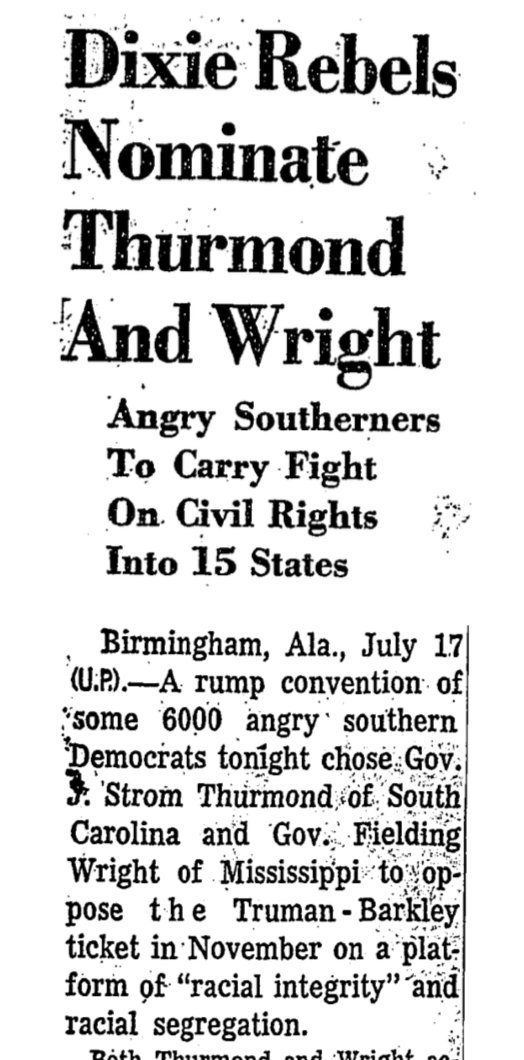
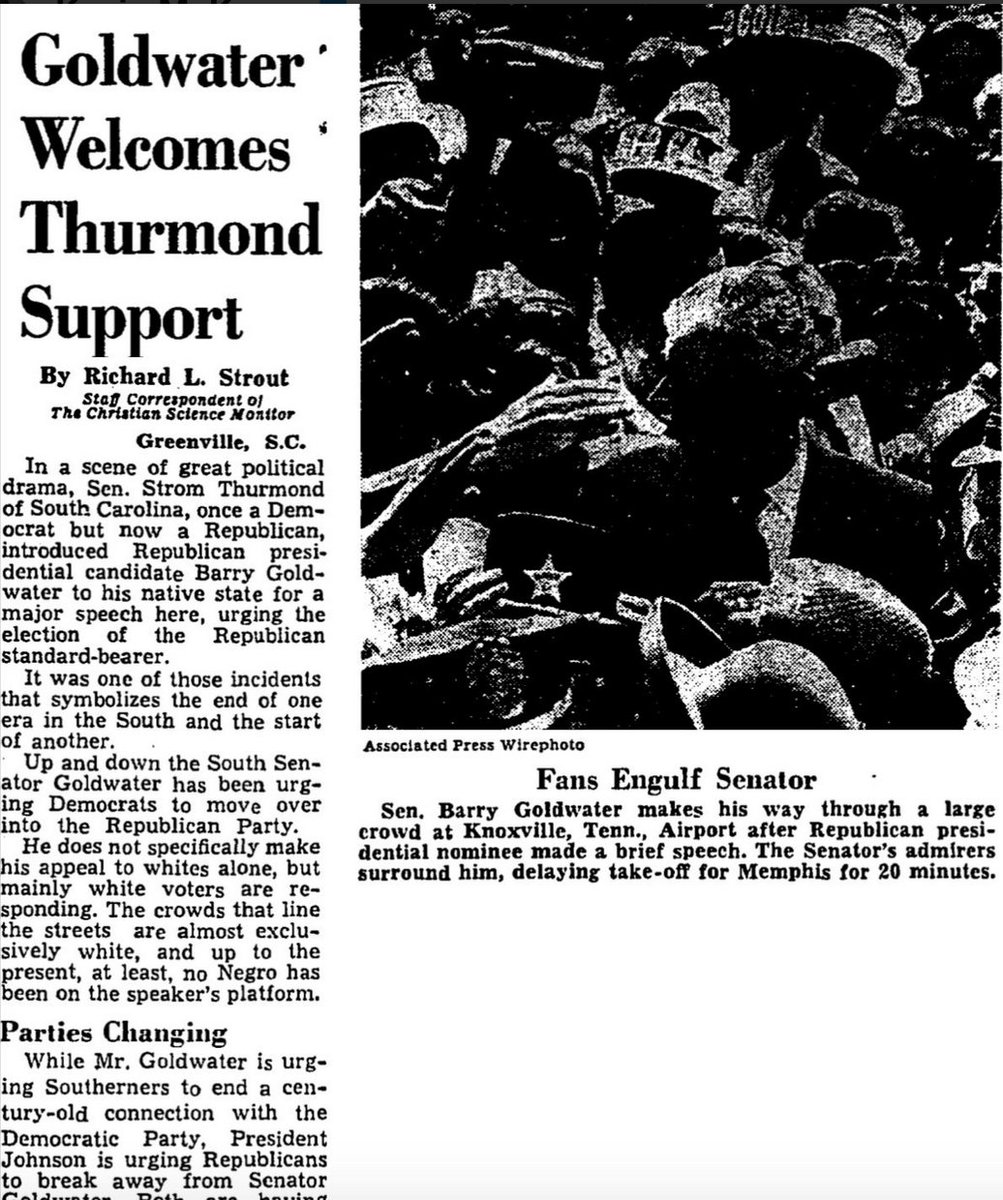
2. But before Thurmond, John Tower left the Democrats in the early 1950s and won election as the first GOP senator in the modern South.
Tower spoke out against civil rights, joined with S. Dems to plot filibusters, and voted against the Civil Rights Act & Voting Rights Act.
Tower spoke out against civil rights, joined with S. Dems to plot filibusters, and voted against the Civil Rights Act & Voting Rights Act.
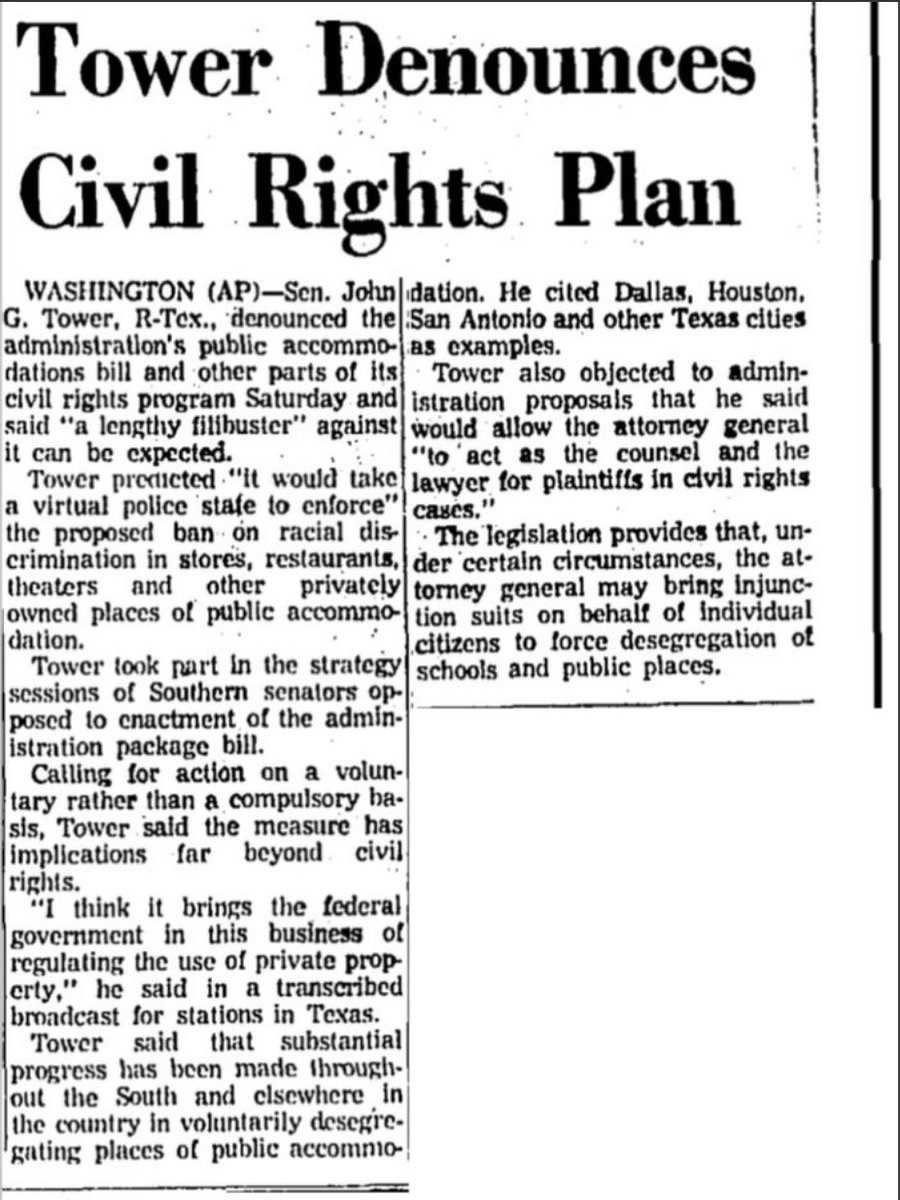
The House was quicker to see changes.
3. Rep. William C. Cramer, the first GOP rep in Florida, for instance, switched from the Democrats in 1949, won election in 1954, urged Ike to withdraw troops from Little Rock in 1957 and voted against the Civil Rights Act of 1964.
3. Rep. William C. Cramer, the first GOP rep in Florida, for instance, switched from the Democrats in 1949, won election in 1954, urged Ike to withdraw troops from Little Rock in 1957 and voted against the Civil Rights Act of 1964.
4. Likewise, Rep. Edward Gurney, the second GOP representative in Florida, also abandoned the Democratic Party in the early 1960s, ran for Congress as a Republican in 1962 and won, and then voted against the Civil Rights Act of 1964 and the Voting Rights Act of 1965.
5. Rep. Dave Treen (R-LA) -- protege of legendary segregationist Leander Perez and a 1960 elector for the States Rights Party (a.k.a. "the Dixiecrats") -- switched to the GOP in 1962.
He lost a few early races, but then won his seat in 1973 and later became governor in 1980.
He lost a few early races, but then won his seat in 1973 and later became governor in 1980.
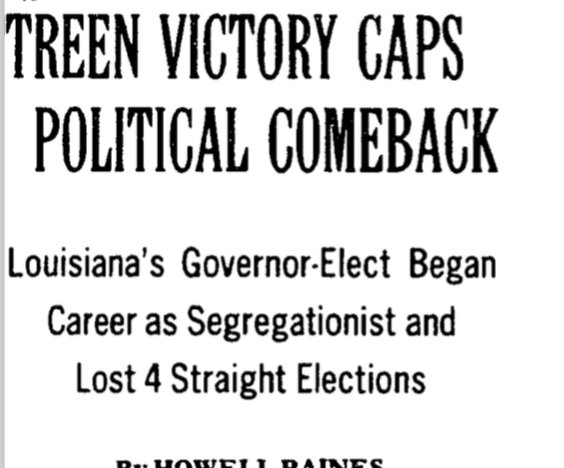
6. Rep. Iris Faircloth Blitch, a segregationist who represented Georgia in Congress as a Democrat from 1955-1962, left the party over civil rights in 1964 and campaigned for Barry Goldwater.
7. Rep. James D. Martin (R-AL), originally a Democrat, joined the GOP in 1962 & won a House race in 1964.
During the Selma protests, he denounced MLK Jr. as a "rabble-rouser who has put on the sheep's clothing of non-violence while he pits race against race, man against law."
During the Selma protests, he denounced MLK Jr. as a "rabble-rouser who has put on the sheep's clothing of non-violence while he pits race against race, man against law."
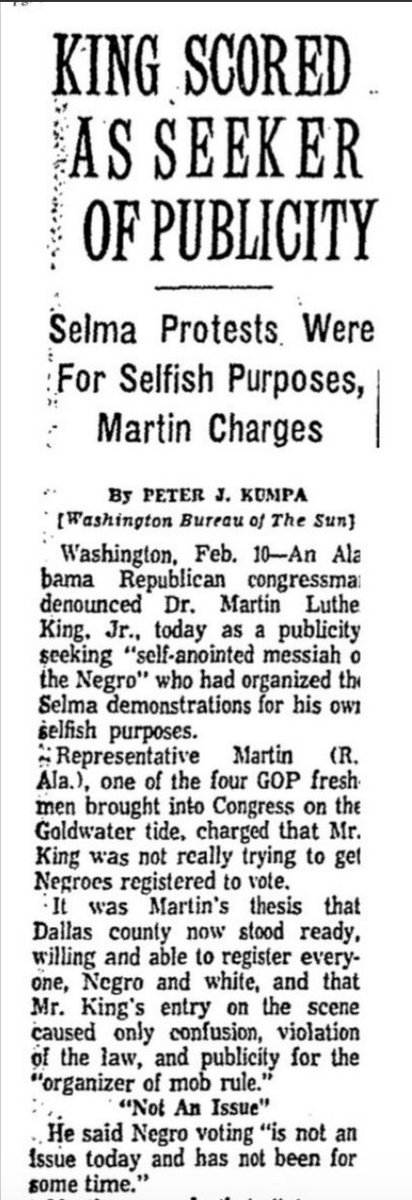
8. Rep. Bill Dickinson (R-AL), originally elected as a Democratic judge, likewise switched to the GOP and made headlines during the Selma-to-Montgomery march.
He insisted, from the House floor, that the civil rights marchers were actually a radical group engaged in wild orgies.
He insisted, from the House floor, that the civil rights marchers were actually a radical group engaged in wild orgies.
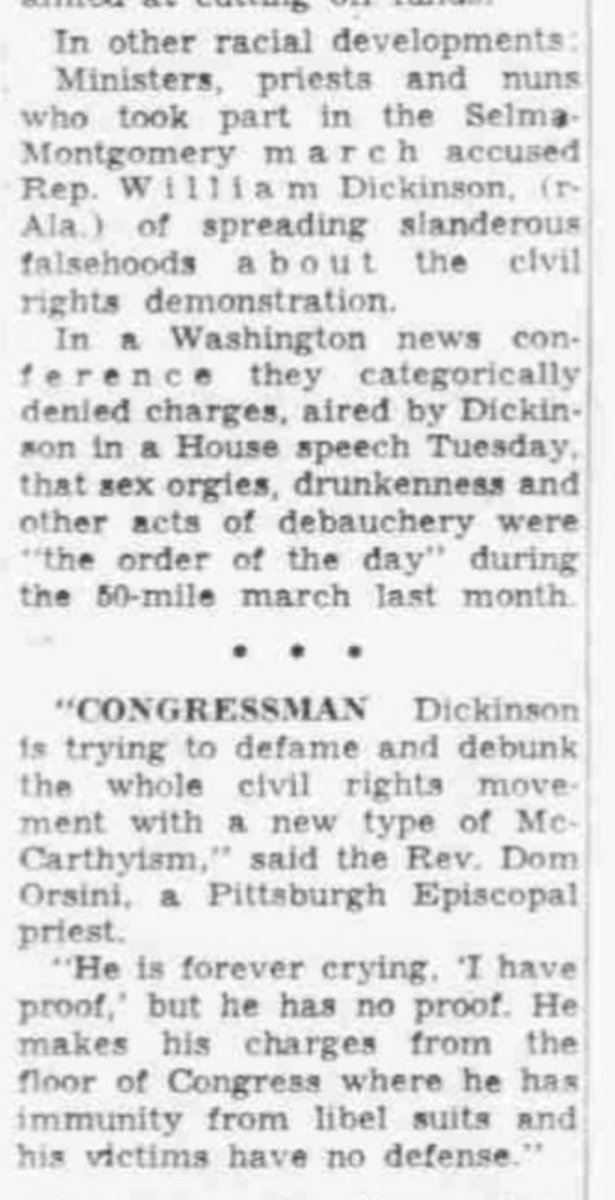
9. Rep. Bo Callaway (R-GA) likewise abandoned the Democrats over civil rights and won a spot as the first Republican congressman from Georgia since Reconstruction.
A staunch segregationist, he promised to repeal the Civil Rights Act & then voted against the Voting Rights Act.
A staunch segregationist, he promised to repeal the Civil Rights Act & then voted against the Voting Rights Act.
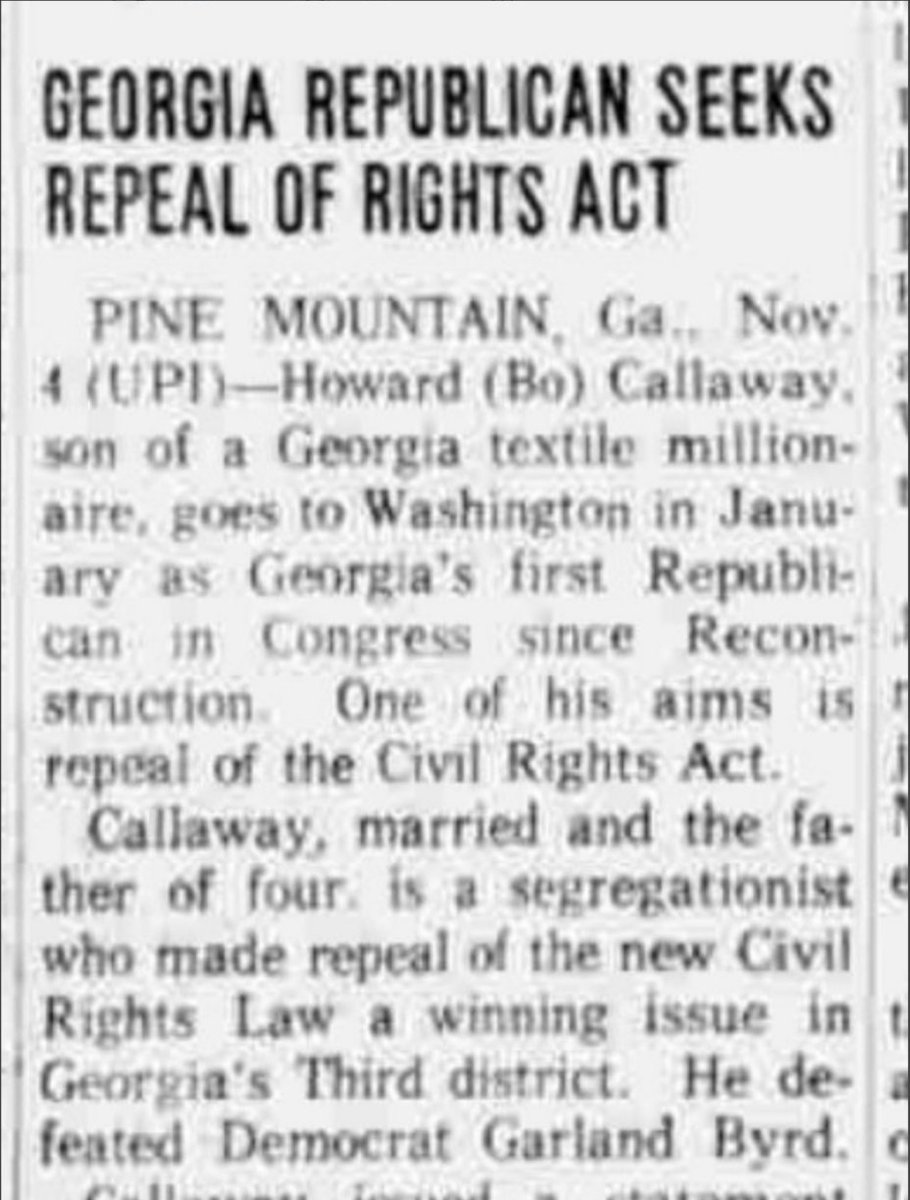
10. Meanwhile, in South Carolina -- where Sen. Strom Thurmond, the original Dixiecrat, had just bolted to the GOP -- a congressman did the same.
Segregationist Rep. Albert Watson publicly backed Goldwater in 1964. In retaliation, House Dems stripped him of his seniority.
Segregationist Rep. Albert Watson publicly backed Goldwater in 1964. In retaliation, House Dems stripped him of his seniority.
So Rep. Watson resigned from Congress in 1965 (after voting against the VRA), became a Republican, and retook his old seat in a special election.
After he won, he called for investigations into "subversive" civil rights groups.
After he won, he called for investigations into "subversive" civil rights groups.
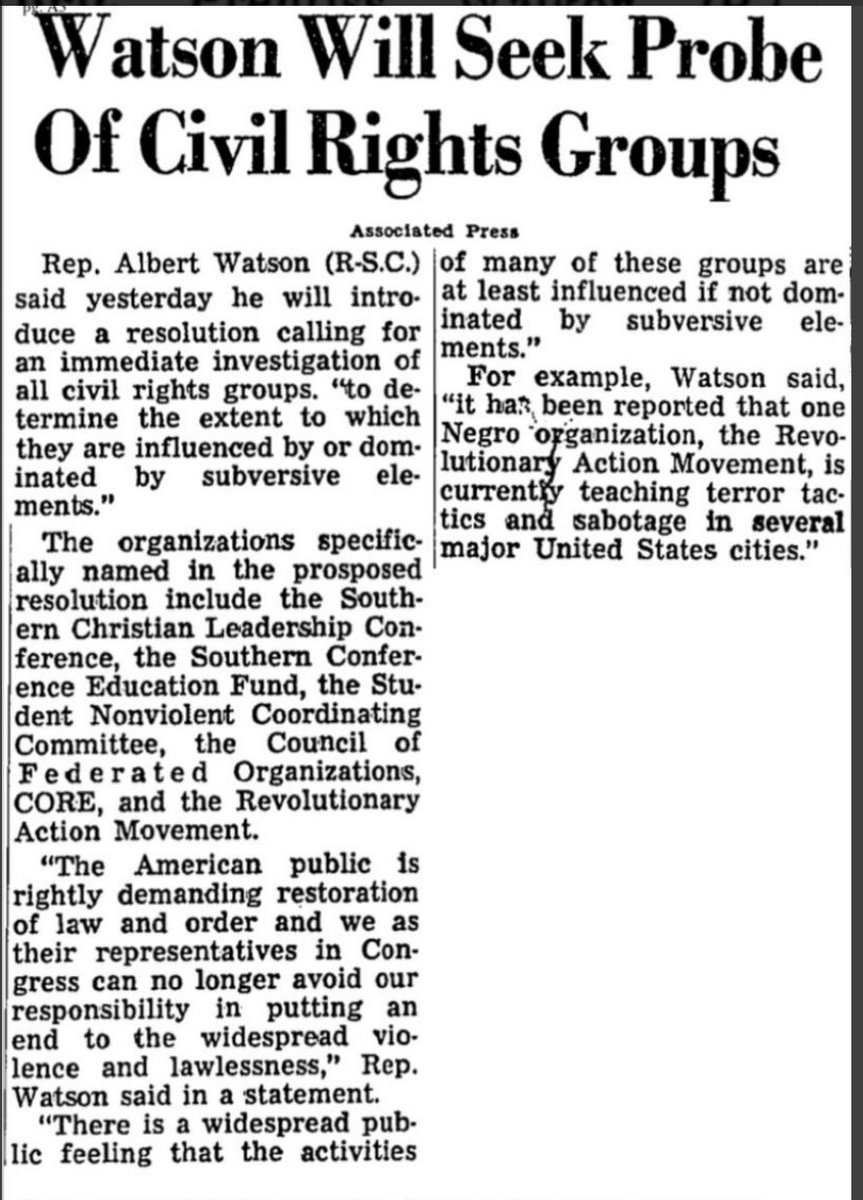
11. In Mississippi, Thad Cochran -- a lifelong Democrat -- switched to the GOP in 1964 in opposition to the Civil Rights Act.
He then went on to head Nixon's Mississippi campaign and then win elections as a congressman and then senator.
He then went on to head Nixon's Mississippi campaign and then win elections as a congressman and then senator.
12. Meanwhile, Rep. Trent Lott had been an aide to Dixiecrat William Colmer, who stayed a Dem because seniority made him the head of the powerful House Ways and Means Committee.
Colmer chose Lott to succeed him in 1972, but had him run as a Republican. nytimes.com/2002/12/15/us/…
Colmer chose Lott to succeed him in 1972, but had him run as a Republican. nytimes.com/2002/12/15/us/…
13. Jesse Helms made the same transition.
He'd grown up a Dem, helping Democrat Willis Smith run a race-baiting campaign for a senate seat in 1950 (see the ad below).
When Helms ran for the Senate on his own in 1972, however, just like Lott, the former Dem ran as a Republican.
He'd grown up a Dem, helping Democrat Willis Smith run a race-baiting campaign for a senate seat in 1950 (see the ad below).
When Helms ran for the Senate on his own in 1972, however, just like Lott, the former Dem ran as a Republican.
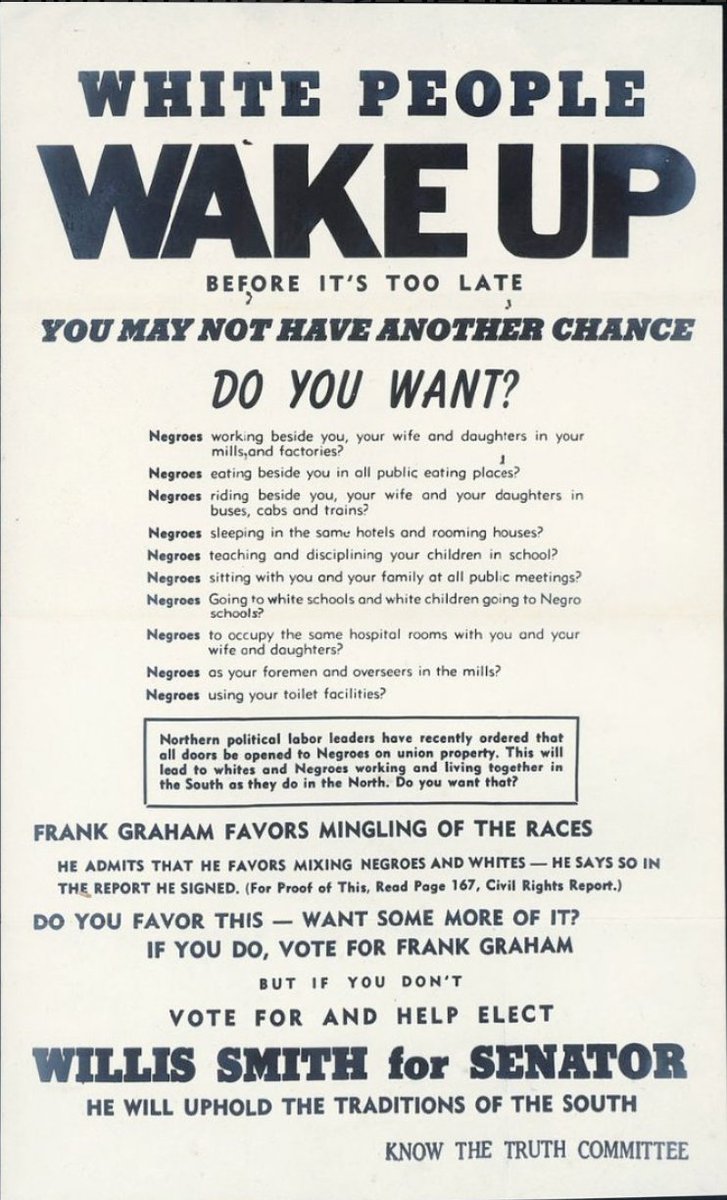
These are just examples of party switchers who *won*.
Several Dems switched to the GOP for Senate runs and didn't make it.
See:
15. Taylor O'Hearn in Louisiana
16. W.D. Workman in South Carolina
17. Marshall Parker in South Carolina
Several Dems switched to the GOP for Senate runs and didn't make it.
See:
15. Taylor O'Hearn in Louisiana
16. W.D. Workman in South Carolina
17. Marshall Parker in South Carolina
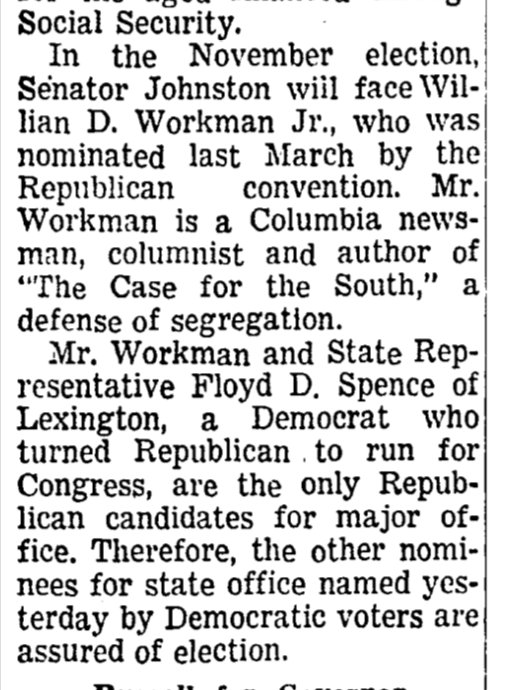
If you look beyond Congress -- again, the place where party switches were *least* likely to happen for institutional reasons -- you can see several more examples.
Governors, for instance, could switch more easily.
18. In Virginia, Democratic Gov. Mills Godwin, an outspoken leader of the state's Democratic segregationist resistance, switched parties and won re-election as a Republican in 1973.

18. In Virginia, Democratic Gov. Mills Godwin, an outspoken leader of the state's Democratic segregationist resistance, switched parties and won re-election as a Republican in 1973.
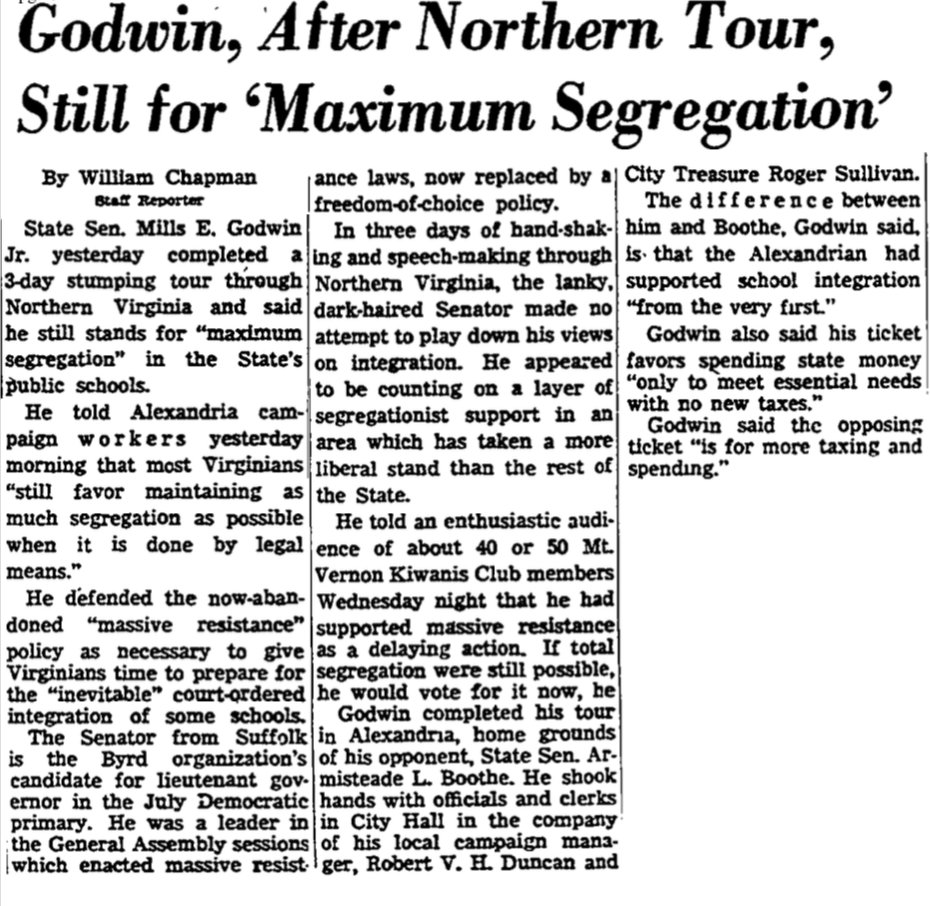
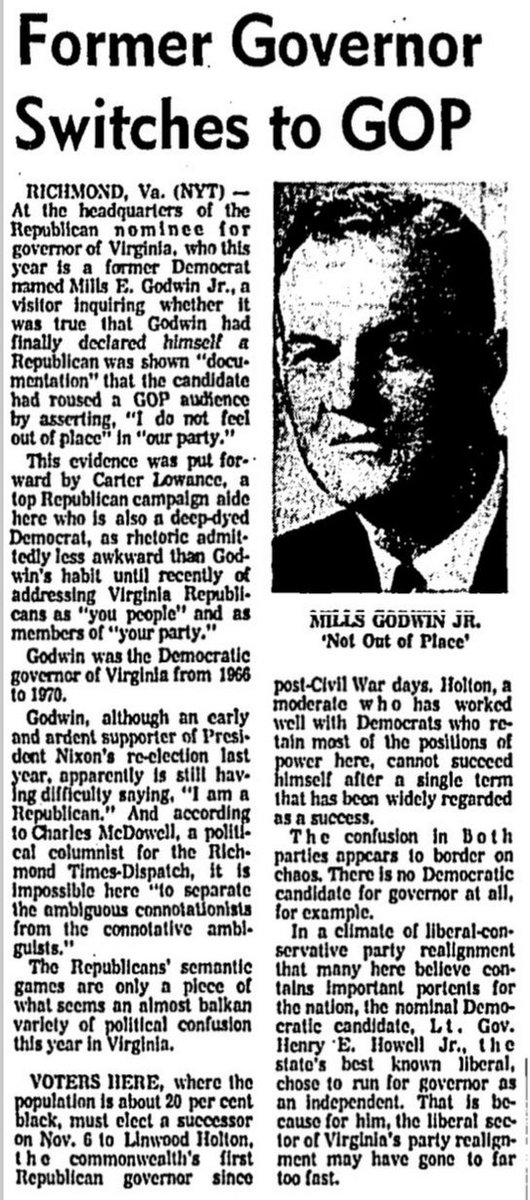
State legislatures had more switches.
Again, this isn't what historians stress in party realignment, but yes, it happened.
Here's a terrific new book on it, by the way:
press.princeton.edu/titles/10750.h…
Again, this isn't what historians stress in party realignment, but yes, it happened.
Here's a terrific new book on it, by the way:
press.princeton.edu/titles/10750.h…
For some examples in state legs:
19. SC Rep. Arthur Ravenel Jr.
20. SC Rep. Floyd Spence
21. Texas Rep. Jack Cox
22. Mississippi Sen. Stanford Morse
23. Alabama Rep. Albert Goldthwaite
24. Louisiana Rep. Roderick Miller
25. South Carolina Sen. Marshall Parker
Etc etc.
19. SC Rep. Arthur Ravenel Jr.
20. SC Rep. Floyd Spence
21. Texas Rep. Jack Cox
22. Mississippi Sen. Stanford Morse
23. Alabama Rep. Albert Goldthwaite
24. Louisiana Rep. Roderick Miller
25. South Carolina Sen. Marshall Parker
Etc etc.
Or you can consider the switches made by state-level elected officials.
26-30. For instance, in 1968, five of the top officeholders in Georgia switched from the Democrats to the Republicans:
26-30. For instance, in 1968, five of the top officeholders in Georgia switched from the Democrats to the Republicans:
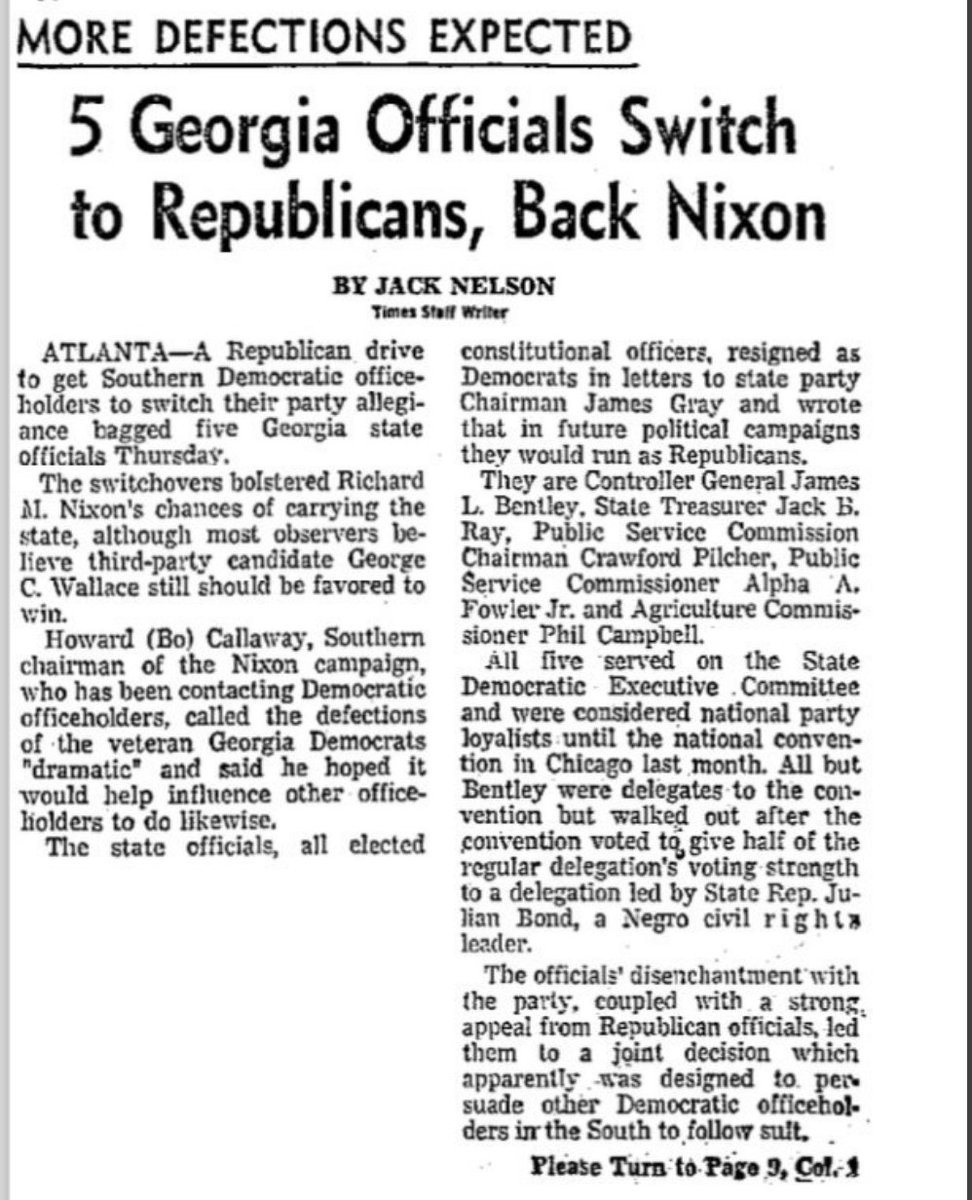
All right, that's probably more than enough to make the point.
Again, looking at elected officials is the worst way to measure these changes. (And, of course, that's why D'Souza insists on doing it that way.)
Again, looking at elected officials is the worst way to measure these changes. (And, of course, that's why D'Souza insists on doing it that way.)
Professional politicians -- even more so then than now -- rarely switched tracks, because it usually meant starting over from scratch.
There were efforts to get more S. Dems to switch (see below), but without the Thurmond Deal, few wanted to switch.
There were efforts to get more S. Dems to switch (see below), but without the Thurmond Deal, few wanted to switch.
https://twitter.com/KevinMKruse/status/992842365953085442
Individual careers changed course slowly, though, and in piecemeal fashion. The idea that the region's representatives switched parties at the same time is a straw man.
What did change were public perceptions of the parties on matters of civil rights, as @edsall noted here.
What did change were public perceptions of the parties on matters of civil rights, as @edsall noted here.
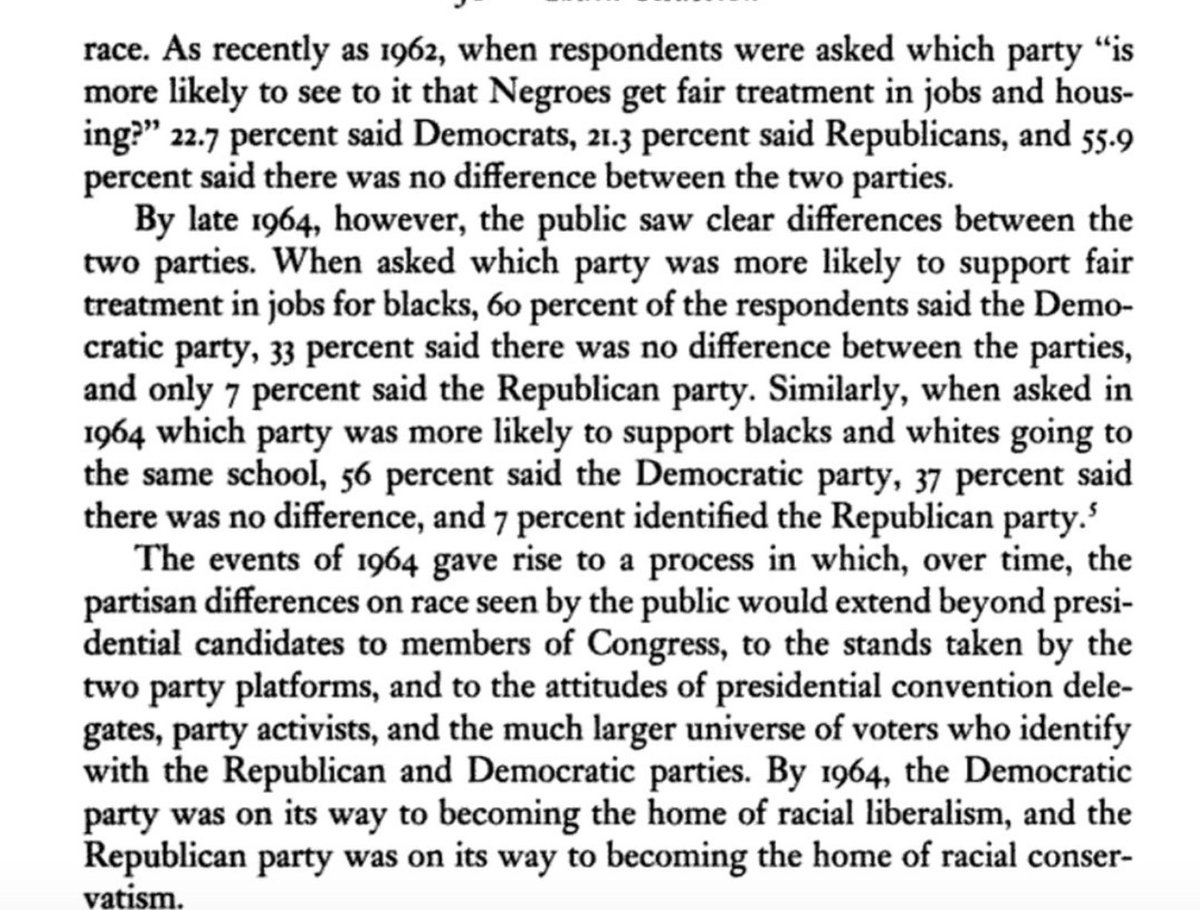
Hmm, I seem to have broken Twitter again, as several tweets are failing now. I'll take that as a sign to wrap it up.
Well, if you want more on this, check out Merle Black and Earl Black's classic: amazon.com/Rise-Southern-…
Well, if you want more on this, check out Merle Black and Earl Black's classic: amazon.com/Rise-Southern-…
Also, some other threads on the topic:
https://twitter.com/KevinMKruse/status/1014134392250404865
• • •
Missing some Tweet in this thread? You can try to
force a refresh








